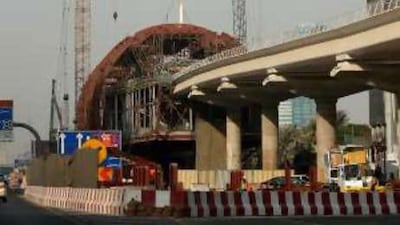The creation of a cross-Emirates rail network moved a step closer yesterday as the first details emerged of the national body that will oversee the link. Government officials told a conference in Dubai that it would soon create the company to oversee a 900km line, from Fujairah to the Saudi border, and regulate a wider network. In turn, it could feed into an international system, currently being discussed by GCC states. Abdulla Alkatheeri, director of the land transport department at The National Transport Authority, said the authority would create a body responsible for making policies and regulations for rail transport in the country. It would regulate a system for passengers and freight, that would deal with national and international business. He said that once the official announcement was made, "things will go very fast". The requirement for a rail link in the UAE and across the region is largely motivated by the need to move freight more effectively, though it is expected there will be passenger services as well. Abdul al Hassan, director of planning and development at the Roads and Transport Authority, told the conference in Dubai that the city's rail infrastructure would be co-ordinated with the new company to ease integration of the proposed national line. Mr Hassan said: "We're fully co-ordinating with them. The alignment is tentative at the moment, but our master plan will study the integration between the two networks." Asked whether the trans-Emirates railway would pass through Dubai or skirt the city, he replied: "We will try to minimise the impact of the national line on existing developments here." The first phase of the UAE's rail network would see a double track railway built from Ruwais in Abu Dhabi to Fujairah. Eventually, there would be about 900km of track running from the coast to the Saudi border. The alignment of the railway, which is expected to reduce the number of lorries on the roads by almost a third, has not been finalised but is "almost clear" for Abu Dhabi, the largest of the seven emirates, Mr Alkatheeri said. Its alignment with Dubai, however, was likely to change, due to the fast pace of development there. Mr Hassan said details of planned light railway networks were constantly having to be altered to accommodate developments being announced at events such as Cityscape. Dubai's metro system is not connected to the wider national project. The railway is being funded by the Government for now, though Mr Alkatheeri said it was likely that there would be opportunities for the private sector to "step in". Meanwhile in Doha, GCC officials yesterday discussed the feasibility study for a GCC rail network that would connect the member states. The GCC rail network would provide a direct link between ports on the Arabian Sea and the Gulf. Annual growth in container shipping has been more than 20 per cent throughout the Gulf, Mr Alkatheeri said. Mr Alkatheeri, who had been in Doha on Tuesday, said it was possible the ministers would take the recommendations from the study to the leaders of the GCC countries ahead of a meeting at the end of the year. "It looks like a good project," he said. "That is a big decision, I cannot announce it is finished, but it is a really very promising indication from the study," he said. Final recommendations for the GCC project are expected in the next six months, according to Dr Ramiz al Assar, a senior transport analyst at the World Bank based in Saudi Arabia, who has been advising the GCC secretariat on rail links. Some issues still need to be ironed out, including how the cost of the project will be split among the GCC member states. If each state built its share of the rail network, it would be "a very feasible project", Mr Alkatheeri said. "I think it's a political project and I think it is something we have to work on to tie the economics." At the conference, Abdelgader Elshabani, senior transportation planning specialist at the DoT, said a rail line was needed to link Abu Dhabi with Dubai as the two emirates continued to grow. The national rail proposals were presented at the conference being held at the Park Hyatt Hotel and hosted by MEED, the business intelligence provider. mchung@thenational.ae arichardson@thenational.ae

Body to bring cross-Emirates rail network
Estimated 900km of track will run from the coast to the Saudi border in system expected to cut lorries on the roads by almost a third.
Most popular today
